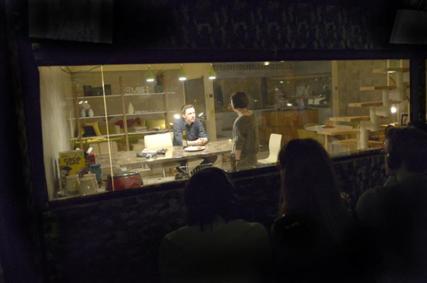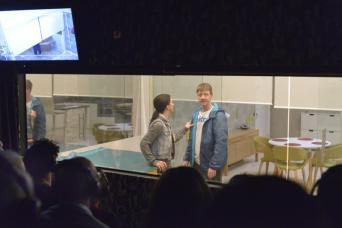Game – Almeida Theatre, until 04 April 2015 (Tickets)
This review contains spoilers. If you want to know nothing about Game then read no further.
Civilian Theatre rarely bothers with spoiler announcements as it usually possible to talk about a play without needing to go into any specific elements that would ruin the element of surprise. However the Almeida has been tight lipped about the production and going in blind – having avoided reviews entirely – really enhanced the impact of the show.
Game is Mike Bartlett’s follow-up to the crowd-pleasing smash-hit King Charles III, which started life at the Almeida before setting up camp in the West End. Where King Charles III paid homage to Shakespeare’s history plays, was written in iambic verse and clocked in at over two hours, Game more than nods towards Big Brother, is written in modern English and is wrapped-up in less than hour.
However they share a common theme in that they both exist in an off-kilter near-future world where events occurring seem unlikely but are not impossible to imagine. In both Bartlett displays an interest in society’s relationship with privacy. In King Charles III we see the issue played out on the grand scale – a ‘great men of history’ perspective that sees change arriving from the top down.
In Game we see another reality; a constant chipping away of our notion of privacy from the bottom-up. It is a world where entrepreneurs continually test the boundaries of acceptability until we have reduced people to the same voyeuristic abstraction that we hold for animals in the zoo. The starting point may be hard to pin down but Big Brother will be remembered as a watershed moment; the point where we realised that people would volunteer to be placed under constant surveillance to entertain the masses, and the masses tuned watched in their droves.
Game takes this moment and follows the idea to its natural conclusion. Eventually watching isn’t enough. Voting people out satisfied needs for a while but, as I’m A Celebrity proved, given the choice we prefer to also have the option of meting out ritual humiliations on those who take part. John (Daniel Cerqueira) keeps prodding at those boundaries; initially renting out a house to a couple where it appears we get to watch them live their normal lives, before it becoming apparent that they are in fact prey for those who can afford it.
Bartlett develops – but doesn’t seek to provide answers for – an interesting question (highlighted by Victoria Sadler in her Huffington Post review) around the limits of consent amongst the vulnerable. It is a highly political question and the answer can be debated but within the play Carly (Jodie McNee) and Ashley (Mike Noble) are dangled a carrot and it is soon clear that, despite clear drawbacks, they become habitualised to the desensitising violence and eventual become dependent on it for their own survival in a world their celebrity has caused them to become unemployable pariahs.
 The play would not really work without Miriam Buether (and her teams) sensational redesign of the Almeida space. It no longer resembles a theatre but instead the hermetic sealed world of the TV studio. The audience watches behind two-way mirrors and listens through headphones to microphone links. We become the voyeurs sustaining the show and we are complicit in what we are watching. Indeed through Sacha Wares sympathetic direction we are given an explicit choice at one point to either watch Carly and Ashley have sex, or focus on a monitor trained on a security guard who turns his back on the action.
The play would not really work without Miriam Buether (and her teams) sensational redesign of the Almeida space. It no longer resembles a theatre but instead the hermetic sealed world of the TV studio. The audience watches behind two-way mirrors and listens through headphones to microphone links. We become the voyeurs sustaining the show and we are complicit in what we are watching. Indeed through Sacha Wares sympathetic direction we are given an explicit choice at one point to either watch Carly and Ashley have sex, or focus on a monitor trained on a security guard who turns his back on the action.
The design works brilliantly and possibly lends more credit to the play than it might otherwise deserve. A lot of what Bartlett covers does feel like it has been covered elsewhere – not least in the more chilling, satirical Black Mirror. There is also a sense that Bartlett has looked to create something that could be realistic but I think that he underestimates the moralising backlash that the show would face.
Whilst the Daily Mail’s Sidebar of Shame would happily pump out all the latest action, the real power remains in its editorials and – particularly when the issue of children is raised – it is hard to believe the government wouldn’t take action in the face of a sustained attack from the Guardian on the left (protecting the vulnerable) and the Mail on the right (protecting the nation’s morals).
The last scene redeems much of the previous weakness. Here there is a dramatic twist where we gain an insight into the mind of the soldier who acts as a guard for much of the time. Bartlett widens the play out and the ideas can be seen in a whole new prism; we get a sense of a global perspective and the powerful voices of those who could tell their own stories – “The drones are like the angels of death, […] Only they know when and where they will strike.” We are suddenly very aware that there are people who live under constant surveillance and who spend their daily life never knowing when a fatal shot may come.
And the world of Game doesn’t appear so absurd after all.

One thought on “Game”